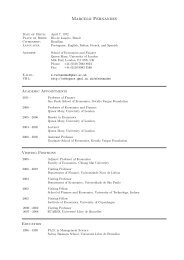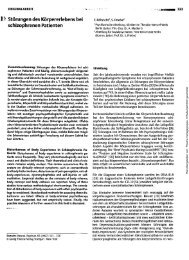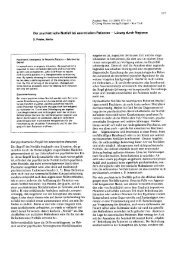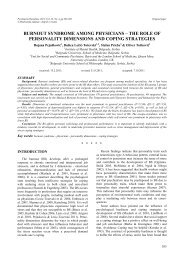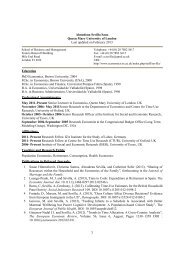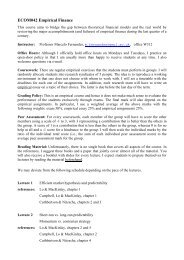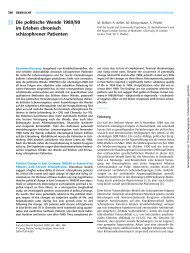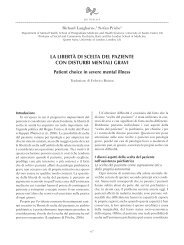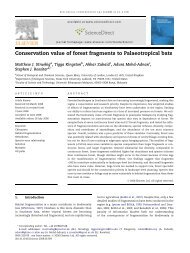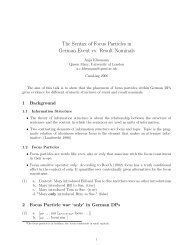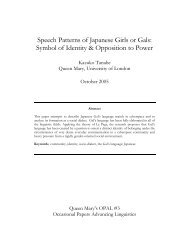Proofs - Personal Webspace for QMUL - Queen Mary, University of ...
Proofs - Personal Webspace for QMUL - Queen Mary, University of ...
Proofs - Personal Webspace for QMUL - Queen Mary, University of ...
Create successful ePaper yourself
Turn your PDF publications into a flip-book with our unique Google optimized e-Paper software.
© 2012 Elsevier Masson SAS. All rights reserved.<br />
European Psychiatry 27 (2012) / supplement n°2 / S63-S69<br />
<strong>Pro<strong>of</strong>s</strong><br />
EUROPEAN<br />
PSYCHIATRY<br />
THE JOURNAL OF THE EUROPEAN PSYCHIATRIC ASSOCIATION<br />
The concept <strong>of</strong> “intercultural opening”: the development <strong>of</strong> an assessment<br />
tool <strong>for</strong> the appraisal <strong>of</strong> its current implementation in the mental health<br />
care system<br />
S. Penka a, * , U. Kluge a , A. Vardar a , T. Borde b , D. Ingleby c<br />
a Department <strong>of</strong> Psychiatry and Psychotherapy, Charité Berlin, Germany<br />
b Alice Salomon <strong>University</strong> <strong>of</strong> Applied Science, Berlin, Germany<br />
c Faculty <strong>of</strong> Social and Behavioral Sciences, Utrecht <strong>University</strong>, Netherlands<br />
Keywords:<br />
Immigration<br />
Mental health care<br />
Germany<br />
Intercultural opening<br />
Assessment tool<br />
1. Introduction<br />
ABSTRACT<br />
In the past, European countries have developed different<br />
approaches to improve the accessibility and quality <strong>of</strong> health<br />
and social care services <strong>for</strong> migrants. In the United Kingdom, <strong>for</strong><br />
example, an approach named “Equality and Diversity Strategy”<br />
has been implemented while other European countries like Italy<br />
and the Netherlands have adopted “intercultural health strategies”<br />
[23], based on “cultural competence” concepts borrowed<br />
from the United States [1,3]. Since the 1990s, an approach called<br />
“intercultural opening” [2,13] has been promoted as a way <strong>of</strong><br />
improving the accessibility and quality <strong>of</strong> services <strong>for</strong> migrants<br />
in Germany. Based on this approach, guidelines <strong>for</strong> the mental<br />
health care system were announced by pr<strong>of</strong>essional psychiatric<br />
* Corresponding Author.<br />
E-mail address: simone.penka@charite.de (S. Penka)<br />
68767<br />
ISSN 0924-9338<br />
June 2012<br />
Vol. 27 - Supplement n°2<br />
pp. S1-S81<br />
Migration<br />
and Mental Health<br />
S1 Editorial<br />
A. Heinz, U. Kluge<br />
S4 The willingness to participate in health research<br />
studies <strong>of</strong> individuals with Turkish migration<br />
backgrounds: barriers and resources.<br />
A qualitative analysis <strong>of</strong> focus groups<br />
D. Dingoyan, H. Schulz, M. Mösko<br />
S10 Socio-economic status and emotional distress<br />
<strong>of</strong> female Turkish immigrants and native<br />
German women living in Berlin<br />
MC. Aichberger, Z. Bromand, A. Heredia<br />
Montesinos, S. Temur-Erman, A. Mundt, A.<br />
Heinz, MA. Rapp, M. Schouler-Ocak<br />
S17 Mental health <strong>of</strong> Turkish woman in Germany:<br />
resilience and risk factors<br />
Z. Bromand, S. Temur-Erman, R. Yesil,<br />
A. Heredia Montesinos, MC. Aichberger,<br />
D. Kleiber, M. Schouler-Ocak, A. Heinz,<br />
MC. Kastrup, MA. Rapp<br />
S22 The infl uence <strong>of</strong> stigma on depression, overall<br />
psychological distress, and somatization<br />
among female Turkish migrants<br />
A. Heredia Montesinos, MA. Rapp, S. Temur-<br />
Erman, A. Heinz, U. Hegerl, M. Schouler-Ocak<br />
S27 Translation and adaptation <strong>of</strong> the Zung<br />
Self-Rating Depression Scale <strong>for</strong> application<br />
in the bilingual Azerbaijani population<br />
F. Mammadova, M. Sultanov, A. Hajiyeva,<br />
M. Aichberger, A. Heinz<br />
S32 Construction and interpretation <strong>of</strong> self-related<br />
function and dysfunction in Intercultural<br />
Psychiatry<br />
A. Heinz, F. Bermpohl, M. Frank<br />
S44 Explanatory models and concepts <strong>of</strong> West<br />
African Malian patients with psychotic<br />
Symptoms<br />
F. Napo, A. Heinz, A. Auckenthaler<br />
S50 How to express mental health problems:<br />
turkish immigrants in Berlin compared to native<br />
Germans in Berlin and Turks in Istanbul<br />
A. Vardar, U. Kluge, S. Penka<br />
S56 Health services and the treatment <strong>of</strong><br />
immigrants: data on service use, interpreting<br />
services and immigrant staff members<br />
in services across Europe<br />
U. Kluge, M. Bogic, W. Devillé, T. Greacen,<br />
M. Dauvrin, S. Dias, A. Gaddini, NK. Jensen,<br />
E. Ioannidi-Kapolou, R. Mertaniemi,<br />
R. Puipcinós i Riera, S. Sandhu, A. Sarvary,<br />
JFF. Soares, M. Stankunas, C. Straßmayr,<br />
M. Welbel, A. Heinz, S. Priebe<br />
S63 The German concept <strong>of</strong> “intercultural opening”<br />
as an answer to challenges <strong>of</strong> migration<br />
- the development <strong>of</strong> an assessment tool<br />
<strong>for</strong> the appraisal <strong>of</strong> its current implementation<br />
in the mental health care system<br />
S. Penka, U. Kluge, A. Vardar, T. Borde,<br />
D. Ingleby<br />
S 70 Cross-cultural training in mental health care<br />
– challenges and experiences from Sweden<br />
and Germany<br />
S. Bäärnhielm, M. Mösko<br />
S75 Teaching psychiatry and establishing<br />
psychosocial services – lessons<br />
from Afghanistan<br />
I. Missmahl, U. Kluge, Z. Bromand, A. Heinz<br />
S80 Afterword<br />
A. Kleinman<br />
The German concept <strong>of</strong> “intercultural opening” is an approach to facilitating migrants’ access to the<br />
health care system and improving the care they receive. No data exist concerning the current status<br />
<strong>of</strong> the implementation <strong>of</strong> this approach in Germany, and the concept has never been analysed in<br />
practice. To assess the status <strong>of</strong> “intercultural opening” in the German mental health care system<br />
and to further analyse the concept, we developed a tool by combining pre- existing instruments. In<br />
order to review the preliminary tool we combined experts’ knowledge by carrying out a consensusoriented,<br />
expert- based Delphi process with actual practice by piloting the instrument in each type <strong>of</strong><br />
institution to be assessed. The assessment tool thus developed1 is the fi rst one to evaluate the current<br />
status <strong>of</strong> “intercultural opening” in the community mental health care system in Germany from a<br />
broad perspective. This paper is intended to present the development process <strong>of</strong> our assessment<br />
tool <strong>for</strong> demonstrating the benefi ts <strong>of</strong> this approach and as a model <strong>for</strong> future studies, as well as to<br />
increase transparency in relation to the current German approach to health care structures in dealing<br />
with migrants.<br />
© 2012 Elsevier Masson SAS. All rights reserved.<br />
associations in 2002 [22]. Researchers and practitioners started<br />
to face the fact that immigration into Germany and the integration<br />
<strong>of</strong> migrants could only be successful if German society<br />
changed and started adapting to the needs <strong>of</strong> these citizens [17].<br />
Particular importance was placed on changing the way German<br />
institutions dealt with migrants.<br />
The basic principle <strong>of</strong> the concept <strong>of</strong> “intercultural opening”<br />
is to change institutions to improve the accessibility and quality<br />
<strong>of</strong> services <strong>for</strong> migrants. Each institution should be competent<br />
to ensure equal access and quality <strong>for</strong> all migrants regardless <strong>of</strong><br />
their country <strong>of</strong> origin or native language. “Intercultural opening”<br />
represents a long- term process <strong>of</strong> organizational development with<br />
consequences <strong>for</strong> structure, processes and results [12]. Its goals<br />
include different main approaches on four various levels (Fig. 1).<br />
In 2004, a new immigration law (ZuwG) was passed. For<br />
the fi rst time, the integration <strong>of</strong> <strong>for</strong>eigners was defi ned by law<br />
1 See: http://www.segemi.de/delphiprozess/download/IKOE_P_1_English.pdf<br />
11_Penka.indd S63 14/06/2012 11:32:38



